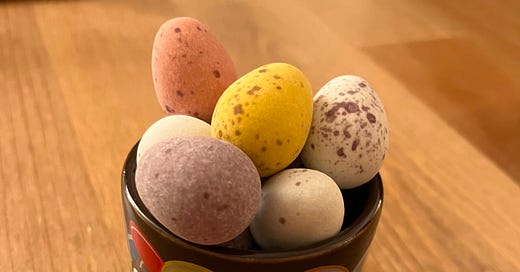It’s a sunny Sunday here in Hampshire, and once again I’m writing this to you from the garden, looking across the sea of bluebells in the lawn. I’ve been out here since breakfast time, when I ate some extraordinarily crunchy granola (it probably woke the neighbours, it was so loud to crunch down on), plus yoghurt and banana and delicious, if out-of-season, blueberries. My second breakfast will no doubt be egg-shaped chocolate.
As if summoned by the thought ‘egg’ and the sound of nuts and seeds, a blackbird has just appeared next to me on the fence. Now another! A blackbird couple. Now a pigeon. I watched Wilding at our film society last week – about the Knepp estate – and I keep thinking about the turtle doves there. The prettiest pigeons around! Also since watching the film, I’ve been looking for chances to use the word ‘rootled’, as in ‘pig-rootled earth’.1 That’s a great word, isn’t it? According to my Word Origins dictionary:
“Root used of an animal turning up the ground with its snout in search of food is a completely different word [different from root related to plant], that may ultimately be linked to Latin rodere ‘gnaw’.”2
Because I’ve been thinking about etymology this week, when I woke up this morning my first thought was ‘where does the word easter come from?’
I’ve talked a lot before about the Wikipedia rabbitholes3 I fall down. Those are nothing compared to the rabbit warren formed by looking something up in printed etymology dictionaries. This is for two reasons. One, they are cross-referenced in an infinitely infuriating/tempting way. For example:
slosh See slush
dilly-dally See shilly-shally
mix See mash
billion See million
gallop See wallop4
Two, they are arranged, as you would reasonably expect a dictionary to be organised, alphabetically. So when I look up one term, another neighbouring one calls out to me for attention. And that’s what happened this morning when I looked up Easter. Straight away I was distracted by a far more enticing term on the same page:
earwig [Old English] Earwigs have nothing to do with wigs. The wig- bit is related to wiggle, which makes a lot more sense. It was once thought that the insect crawled into people’s ears, and the same idea is found in other languages: in French, an ear wig is a perce-oreilles, literally ‘ear-piercer’, and in German it is Ohrwurm, or ‘ear worm’. Ear worm was also used in English for an earwig from the late 16th century. The Germans also used Ohrwurm as a term for those irritating snatches of music that go round and round in your head, and earworm has been used in this sense in English since the 1980s. These tunes are also called sticky tunes in English or a cognitive itch, while the Brazilians call them chichlete de ouvido or ‘ear chewing gum’.
I haven’t heard an earworm being called a ‘sticky tune’ before, but I like how it sounds (the word, not the experience).
Oh yes, and Easter: also an Old English word “probably connected with Ēastre, the name of a Germanic goddess associated with spring and the dawn”. I hope your day is full of blossom and light; Happy Easter.
OK, I’m heading inside to rootle around for that second breakfast. See you next week.
When the possibility did arise, at the pub on Friday, I blanked on what the word was; a missed opportunity indeed.
All quoted material is from the Oxford Dictionary of Word Origins. Edited by Julia Cresswell. Oxford University Press, 2021.
Rebranded as Easter-Bunny Burrows just for today.
The entry for wallop (a word that used to mean gallop) includes the sentence, “It seems that there is something gratifying about the way wallop sounds that makes people use it in lively ways.”




